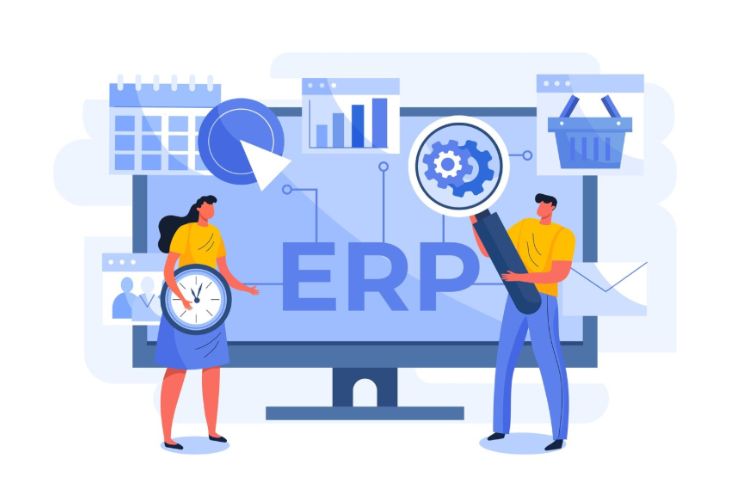1. Your Teams Are Manually Entering the Same Data in Multiple Systems
Manual data entry is one of the most common—and costly—inefficiencies in growing businesses. If your sales, finance, and operations teams are retyping customer records, invoices, inventory levels, or order information into separate systems, you’re not just wasting time—you’re also increasing the risk of errors.
Manual input errors can cause shipment slowdowns, billing errors, and dissatisfied customers. Moreover, these redundant efforts take away from your team’s efficiency and morale.
How ERP Integration Can Help
By linking your ERP with your CRM or online store, you can have data exchanged automatically between platforms. For instance, whenever a customer orders on your platform, the information can automatically get updated in your ERP and stock system without the intervention of an operator.
2. Your Data Is Spread Out and Unorganized Across Systems
Are different stories being presented by your finance, sales, and logistics departments’ reports? If your management isn’t receiving correct up-to-date information about performance, it is probable that your business systems aren’t integrated.
Isolated systems prevent analyzing trends, predicting demand, monitoring stock quantities, or compliance. This lack of integration can result in wrong decisions and lost opportunities.
How ERP Integration Works:
Integrating your systems creates a single source of truth. Whether it’s a customer’s order history, payment status, or product availability, everyone—from warehouse staff to the CFO—works from the same up-to-date data. This improves transparency, speeds up decision-making, and enhances accountability.
3. You’re Experiencing Delays in Order Processing or Customer Service
Slow or error-prone order fulfillment is often a sign of system disconnect. If your warehouse has to wait for a manual update from sales, or if support agents can’t access order history because it lives in another tool, you’re not operating efficiently.
Customers’ expectations are stronger than ever before. They expect instant feedback, real-time monitoring, and customized service. If there isn’t real-time sharing of information among systems, your employees will not be able to meet those expectations.
How ERP Integration Helps:
Integrated systems allow customer service representatives to see order status, inventory levels, and previous interactions in a single dashboard. Similarly, the warehouse can start fulfilling an order the moment it is placed, speeding up shipping and minimizing mistakes.
4. Your Business Is Growing—but Your Systems Can’t Keep Up
Since your company is expanding into new geographies, new products, or higher order volume, your current setup may start creaking under the pressure. Independent tools and manual processes mean scaling a mess—causing supply chain synchronization, billing, or customer support bottlenecks.
Independent systems don’t scale. What was fine for a five-people company might collapse under 50.
How ERP Integration Helps:
ERP integration gets your business ready to expand by streamlining operations, allowing for real-time data exchange, and facilitating cross-functional teams. Adding new suppliers, handling multiple warehouses, or opening a new sales channel are all possible because integration allows your systems to keep up with your expansion.
5. You’re Missing Strategic Insights That Drive Business Growth
Business intelligence is just as good as the data it’s fed. If your leadership cannot view KPIs such as sales performance, inventory turnover, or customer lifetime value—you’re flying blind.
Decoupled systems also translate to slow reports, missing data, or inconsistent data points that break analytics trust.
How ERP Integration Assists
Integration consolidates your data across departments and systems and directs it into real-time dashboards and big-data analytics platforms. It enables leadership to make decisions based on data, detect inefficiencies, and uncover new opportunities—all without intuition or old-fashioned spreadsheets.
Final Thoughts
The writing is on the wall: if your business is struggling with redundant data entry, inconsistent data, slow customer response times, scalability challenges, or strategic insight, ERP integration is no longer a choice—it’s a necessity.
A connected ERP system helps you:
- Eliminate operational inefficiencies
- Deliver better customer experiences
- Improve data accuracy and reporting
- Automate repetitive processes
- Support sustainable business growth
Investing in ERP integration doesn’t just improve your internal workflows—it transforms your business into a more agile, responsive, and competitive operation.
If you’re unsure where to start, consult with an ERP integration expert or technology partner who can assess your current ecosystem and design a solution tailored to your business goals.
Contact Us Today













 Database Development
Database Development












































